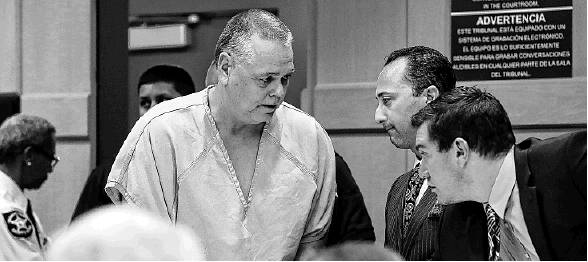EDITORIAL
Don’t arm teachers
Officer’s alleged inaction in Parkland shooting shows that it takes more than a gun to be brave.
Call it irony that Gov. Greg Abbott signed into law a bill expanding Texas’ school marshal program in the same week that a Florida school resource officer was charged with negligence for failing to confront the gunman who killed 14 students and three adults last year at Marjory Stoneman Douglas High School.
Scot Peterson was charged on June 4 with seven counts of child neglect with great bodily harm, three counts of culpable negligence and exposure to harm, and one count of perjury. The warrant for his arrest noted that “as a member of the Broward County Sheriff’s Office, Deputy Peterson had received many hours of training in the proper response to an active shooter situation, and furthermore had received additional training as a School Resource Officer.”
Yet, when Peterson was called on to use that training, he failed. Peterson never entered the school building when the accused gunman was spraying its hallways with bullets on Feb. 14, 2018. People are calling Peterson the “coward of Broward County.” His apparent cowardice, though, raises a couple of questions:
Would a teacher who volunteered to do double duty as a school marshal in Texas act any braver? Some might. Maybe most would. Would those who decide not to engage a shooter be subject to arrest?
The bill Abbott signed June 6 removes the cap on the number of marshals a school may have, which had been 1 per 200 students. It was part of a legislative package he sought after the May 18, 2018, mass shooting at Santa Fe High School that left eight students and two teachers dead.
A separate, more expansive bill includes a number of school safety measures, including requirements that all teachers have access to a telephone or another electronic communication device, that school districts routinely hold drills to prepare students and personnel for an emergency, and that a statewide consortium be created to provide more children with mental health services.
While those programs appear laudable, expanding the school marshal program could lead to disastrous results. “There’s so much potential for mistakes to be made, for unintended injuries to occur,” Gyl Switzer, executive director of Texas Gun Sense, told the editorial board. “A marshal’s gun could be dropped. A student could try to take a marshal’s gun. And what kind of guns are we talking about?”
Texas’ school marshal program, which began six years ago, was modeled after the federal air marshal program. Only certain school officials, local law enforcement and the Texas Department of Public Safety are supposed to know whom the anonymous volunteer marshals are until they are called into action. That, too, is a problem, Switzer said.
“My children went to a large school where not even all the teachers knew each other. If an incident occurs at a large school, an armed marshal might be mistaken for a bad actor,” she said.
Studies showing black students are disproportionately targeted for discipline are also a concern, the gun control advocate said: “I worry about what might happen if an armed school marshal makes an assumption about a kid because of how he looks.”
The fewer than 40 certified school marshals in Texas in 2018 rose to nearly 200 after the Santa Fe shooting. That number is expected to grow now that the program has been expanded. Any teacher or other school staffer can volunteer to be a marshal.
There was an effort in the Legislature to reduce the 80 hours of training marshals must have, but it failed. In the aftermath of what happened in Florida, it’s questionable that any level of training would be enough. In his moment of truth, Peterson, a 30-year veteran, seemed to forget everything he had learned.
Asking teachers, coaches, office staff and counselors to be prepared to safeguard students in an emergency is reasonable. Asking them to take on the role of an armed protector is not.
If the governor and Legislature believe more armed personnel are needed to ensure student safety, they should provide the funds for more schools to hire resource officers with law enforcement backgrounds, and make sure they have more fortitude than Peterson.
